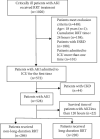The Effect of Long-Term Duration Renal Replacement Therapy on Outcomes of Critically Ill Patients with Acute Kidney Injury: A Retrospective Cohort Study
- PMID: 34504539
- PMCID: PMC8423547
- DOI: 10.1155/2021/6623667
The Effect of Long-Term Duration Renal Replacement Therapy on Outcomes of Critically Ill Patients with Acute Kidney Injury: A Retrospective Cohort Study
Abstract
Background: Renal replacement therapy (RRT), as a cornerstone of supportive treatment, has long been performed in critically ill patients with acute kidney injury (AKI). However, the majority of studies may have neglected the effect of the duration of RRT on the outcome of AKI patients. This paper is aiming to explore the effect of the long duration of RRT on the outcome of critically ill patients with AKI.
Methods: This retrospective study was conducted by using the Multiparameter Intelligent Monitoring in Intensive Care II (MIMIC-II) database. The primary outcome measure of this study was the mortality at 28 days, 60 days, and 90 days in the long-duration RRT group and the non-long-duration RRT group. The secondary outcomes assessed the difference in clinical outcome in these two groups. Lastly, the effect of the duration of RRT on mortality in AKI patients was determined as the third outcome.
Results: We selected 1,020 patients in total who received RRT according to the MIMIC-II database. According to the inclusion and exclusion criteria, we finally selected 506 patients with AKI: 286 AKI patients in the non-long-duration RRT group and 220 in the long-duration RRT group. After 28 days, there was a significant difference in all-cause mortality between the long-duration RRT group and the non-long-duration RRT group (P=0.001). However, the difference disappeared after 60 days and 90 days (P=0.803 and P=0.925, respectively). The length of ICU stay, length of hospital stay, and duration of mechanical ventilation were significantly longer in the long-duration RRT group than those in the non-long-duration RRT group. Considering 28-day mortality, the longer duration of RRT was shown to be a protective factor (HR = 0.995, 95% CI 0.993-0.997, P < 0.0001), while 60-day and 90-day mortality were not correlated with improved protection.
Conclusions: The long duration of RRT can improve the short-term prognosis of AKI patients, but it does not affect the long-term prognosis of these patients. Prognosis is determined by the severity of the illness itself. This suggests that RRT can protect AKI patients through the most critical time; however, the final outcome cannot be altered.
Copyright © 2021 Mengmeng Yang et al.
Conflict of interest statement
The authors declare that they have no conflicts of interest.
Figures


References
LinkOut - more resources
Full Text Sources

